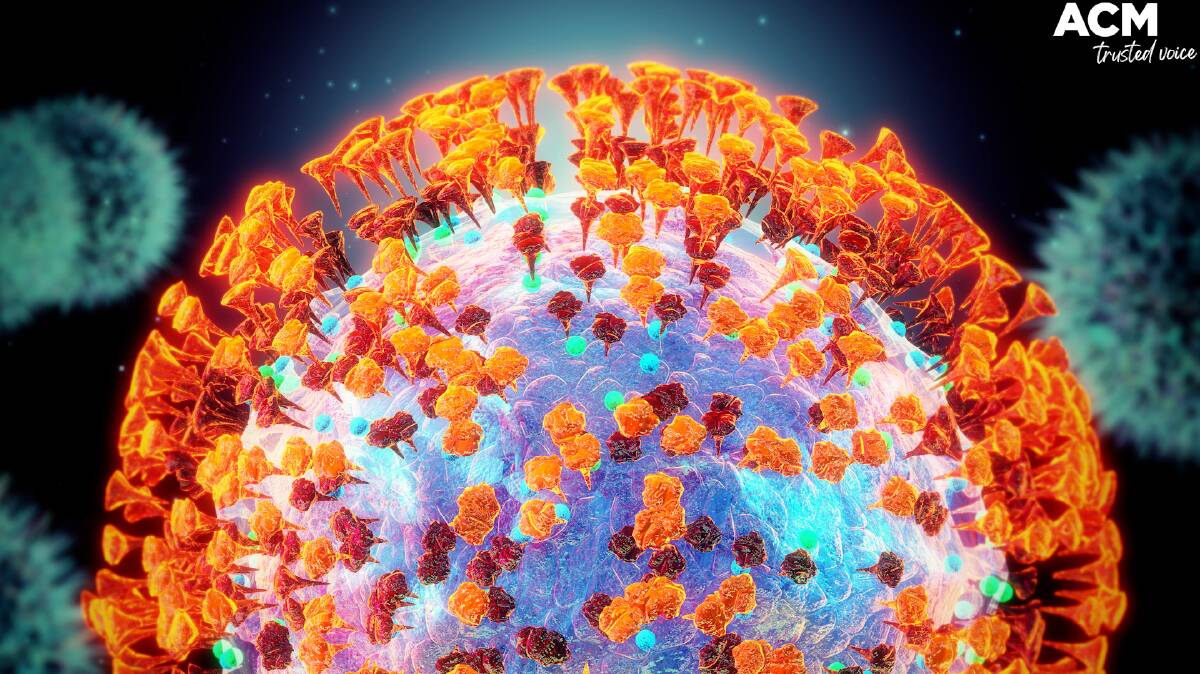A new hybrid variant of COVID-19 has been detected in Australia.
The first cases of the 'Deltacron' were reported on Friday by NSW Health.
Known as a recombinant variant, it is one of two concerning strains of the SARS-CoV-2 virus currently spreading across the world.
The other variant of note is the Omicron XE, which at the time of publication, was yet to be seen in any great number in Australia.
So here's what we know so far about the new variants.

How did the variants come to be?
As the name does suggest, Deltacron is a combination of the previous Delta and Omicron variants of COVID-19.
Meanwhile, Omicron XE is a combination of the Omicron BA.1 and the highly infectious BA.2 variants.
Epidemiologist Professor Adrian Esterman from the University of South Australia told ACM the variants likely developed after someone contracted two separate variants simultaneously.
"What happens is in some unfortunate individuals, they have two variants at the same time," Professor Esterman said.
Watch more:
In the case of Deltacron, the person had contracted Delta and Omicron at the same time. Those variants then mutated together, exchanging parts of the genetic material, and voila, a new variant is born.
According to Professor Esterman, Deltacron was first reported in Cyprus in January, and then it was found in France and the UK. It has since made its way around the world.
On the flip side, experts are also closely watching the emergence of Omicron XE.
The variant has been reported in the UK and is one the World Health Organisation "continues to monitor", according to its statement on Thursday.
"Now that is a combination of Omicron BA.1 and BA.2," Professor Esterman said.
"Again, it's the same thing. Someone was probably infected with both of them, and the two strains shared bits of genetic material."

Is it common for viruses to merge like this?
Yes, in fact it's very common. All variants can recombine.
"You look at the various genetic databases for the SARS-CoV-2 virus, you'll find that there are many of these combinations appearing," Professor Esterman said.
"You will get people who get that combination of say Alpha and Delta or Alpha and Beta.
"It's just that they [the viruses] don't survive or don't have an advantage. And often it basically dies out or gets killed off immediately because it can't survive.
"So as I said, one in a million times, you know, that you actually get a combination is actually viable and gives an advantage."
Related:
So Omicron XE and Deltacron are the million to one chances. Whether or not the variants will become a problem depends on how infectious they prove to be.
"What gives a virus an advantage over a previous version is that it becomes more transmissible either intrinsically or it's more able to evade immune systems, which is what it does," Professor Esterman said.
If you've had Omicron or Delta, can you still catch these new variants?
Likely yes.
If you have caught any variant of COVID-19, and then recovered, there is still a chance that you can catch a variant of COVID-19 again in the future.
Re-infections with COVID-19 can definitely still happen, but you will likely have some boost to your immune system if you have recently recovered from COVID-19.
Will Deltacron or Omicron XE become 'super variants'?
Now that the Deltacron has arrived on Australian soil, there are fears it will soon become dominant.
"The worry about it, of course, is that the actual Deltacron virus has got the body of Delta and the spike of Omicron," Professor Esterman said.
But in all likelihood, it will be the Omicron XE that will cause more problems around the world. It's still in small numbers at the moment, but experts say it has the hallmarks of a very infectious strain.
If it's infectious, it's more transmissible and is therefore likely to hit populations harder.
But, the effect of either Deltacron or XE in Australia is, as Professor Esterman puts it, "the toss of a genetic coin" at this point.
"BA.2 now accounts for about 90 per cent of cases in Australia and will eventually account for 100 per cent of cases in Australia," Professor Esterman said.
"And XE will presumably eventually take over from BA.2 and start accounting for most of the cases.
"BA.2 itself was close to measles, which is our most contagious disease. And so the XE version of Omicron is probably now as transmissible as measles is."
So the Omicron XE is likely very infectious. It will depend on the severity of the illness and the transmissibility associated with either strain.
"And so it can go either way. You know, it is really a tussle of the genetic coin as to whether it's milder than a more severe one or the same as Omicron," said Professor Esterman.
"So at the moment, we simply don't know. We obviously hope that we don't get anything that's nastier than Omicron. But certainly, we can't tell."
How should we protect ourselves against these new strains?
Widespread mask-wearing may not be a thing of the past just yet.
As winter approaches and the flu season collides with the emerging variants, personal protection will be of paramount concern to many.
"Countries may need to be prepared to rapidly put back public health measures if needed," Professor Esterman said.
"Omicron was a gamechanger in the sense that vaccines gave little protection against infection, but they do give very good protection against serious illness and death."
Because the Omicron XE and Deltacron are based on known strains, it's likely these recombinants will respond well to the vaccines.
"So for the moment, until a totally new variant comes along, vaccines will be helpful against these recombinant variants," Professor Esterman said.
"I think the main thing at the moment is not to worry, we are getting these recombinant variants, but at the moment, thank God they are nothing to panic about."


